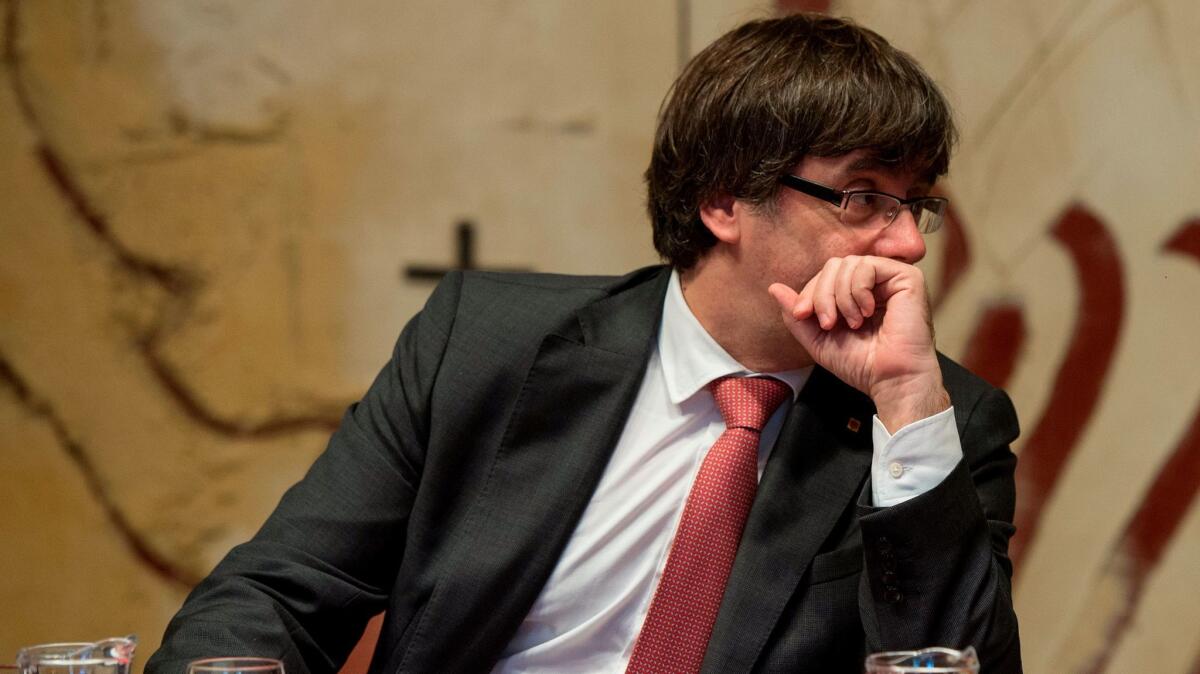Up against Spain’s government, can Catalonia’s president stick to his dream of independence?

- Share via
Reporting from AMER, Spain — The medieval square in Catalan President Carles Puigdemont’s tiny hometown of Amer is lined with Estelada flags and banners supporting independence from Spain.
Banners proclaim “Democracy” and “Not a step back” and “Yes.”
“It’s a personal but also a collective struggle,” Puigdemont said in a text to The Times on Wednesday. “It has committed Catalans from all around the country, from all stratas of life, all ideologies, all generations.”
As Catalonia’s parliament meets in Barcelona on Thursday, Puigdemont is expected to proclaim independence for the northeastern region of 7.5 million people or call elections to avert a takeover by the central government under Article 155 of the constitution, which could be approved by the Senate on Friday in Madrid.
Spain, led by Prime Minister Mariano Rajoy, has said it will invoke constitutional powers to stop the independence movement by imposing direct rule on the region, which has had a degree of autonomy for decades. The government says an Oct. 1 referendum that favored secession was illegal, and officials say turnout was less than half of the eligible voters.
Catalonia, with the tourist hub Barcelona as its capital, has become Spain’s richest region, its residents proud of their distinct language and culture. Some Catalans resent their tax revenue subsidizing other parts of Spain, and say the region would be better off as an independent country.
As leader of the separatists, Puigdemont has remained a key figure in the confrontation between the region and the central government. He has called for talks with Madrid, but government officials have refused to engage as long as independence remains at issue.
Puigdemont, 54, told The Times he is driven by “the desire for liberty for the Catalan people to protect and promote our culture, our standing in the world.”
The Puigdemont family is well-known in Amer, where the regional president’s great-grandfather and uncle served as mayor, both independentistas like his father, Javier, a baker.
His grandfather fought in the Civil War and founded Pastisseria Puigdemont, a popular pastry shop serving traditional carquinyolis — Catalan almond biscotti — capricis d’Amer cookies and other confections since 1928.
The regional president was born in a stone house down one of the narrow cobblestone streets marked with Catalan signs in the town of 2,300, an independentista stronghold about 50 miles northeast of Barcelona amid forests of oak, chestnut and pine.
Puigdemont became politically active as a teenager, helping to found the Nationalist Youth of Catalonia after attending political meetings with his uncle Josep Puigdemont, a Catalan nationalist.
At age 21, Puigdemont was seriously injured in a car accident that left his face slightly scarred, which some say was the origin of his long, Beatle-style haircut (friends say that’s not true). He went on to study philosophy at the university in nearby Girona, a city of 100,000, where he later worked as a journalist at El Punt, a Catalan-language newspaper.
Colleague Saul Gordillo described him as “very direct, very intelligent, with brilliant ideas.” Gordillo recalled how Puigdemont embraced digital news and Twitter to share ideas directly with his audience. He later took a year off to explore linguistic policies in Europe, then founded Catalan News Agency.
In 2011, he was elected mayor of Girona, where he served until he was elected to lead the Catalan government last year. He still lives there with his wife, a Romanian journalist, and two daughters.
Under Puigdemont, Gordillo was appointed director of public Catalunya Radio, a 600,000-listener Catalan-language station, which the central government threatened to take over this week in response to the secessionist vote. He said Puigdemont — who speaks Catalan, French, Spanish, Romanian and English — remains popular with the audience.
“Normally the president of the Catalonian government is from the upper class of Barcelona. He’s not. He’s from a humble family outside of the city. He connects more to the people of the street than the political powers,” he said.
Xevi Xirgo, editor of the Barcelona-based Catalan newspaper El Punt Avui, talked to Puigdemont at the start of his presidency and again recently, when he felt both the weight of the Oct. 1 election, and the risks of declaring independence. Catalonia’s previous leader was fined and barred from public office for organizing an independence referendum in 2014. Two independentista activists were recently jailed.
“In his first speech as president he said he would not falter and that he would lead Catalonia to the gates of independence. He told me that he was prepared to go to prison,” Xirgo said. “He sees it like this: The people haven’t failed, so I can’t either.”
Some experts said Puigdemont could capitulate to pressures within his coalition and from large businesses, some of which have already moved their headquarters elsewhere in Spain. But others fully expected Puigdemont to declare independence.
“He has become Catalonia’s president with nothing to lose on the back of a coalition specially formed as a step towards the formation of an independent state,” said Pablo Simon, a lecturer at Universidad Carlos III de Madrid.
Amer’s deputy mayor, Salvador Clara i Pons, a childhood friend of Puigdemont, said to back down now would mean abandoning his lifelong cause.
“He conceives of Catalonia as a state, which we need to be to survive,” he said. “It’s what he always dreamed about.”
Times staff writer Hennessy-Fiske reported from Amer and Barcelona and special correspondent Badcock from Madrid.
molly.hennessy-fiske@latimes.com
More to Read
Sign up for Essential California
The most important California stories and recommendations in your inbox every morning.
You may occasionally receive promotional content from the Los Angeles Times.














